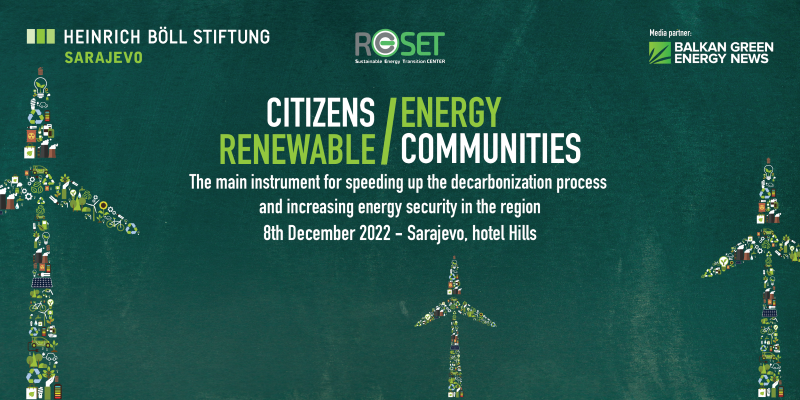News
- Home
- Other activities
- News

- Category: News
After a year of research with the participation of more than a hundred experts from the countries of the region, RESET, as part of the RePower WB project, whose realization is supported by the European Climate Foundation (ECF), completed the evaluation of international policies supporting the decarbonization of the energy sector in the countries of the region.

- Category: News
In 2022, wind power plants (WPPs) in Bosnia and Herzegovina produced 392 GWh of electricity, which is 2% more than the previous year.
In the Western Balkans countries (Albania, Bosnia and Herzegovina, Montenegro, Kosovo, Serbia and North Macedonia), the total installed wind capacity reached 801 MW, whereby Albania is the only country in Southeast Europe without wind capacity in its production portfolio. Malta is the only EU country without wind power plants.
Read more at: https://reset.ba/attachments/article/60/WIND%20BIH%202022_english.pdf

- Category: News
Bosnia and Herzegovina (BIH) follows the global trend of strong growth in the installed power of solar photovoltaic power plants. According to the preliminary data, the total power of these power plants at the end of 2022 exceeded 100 MW. See more in the article prepared by A.Mujčinagić https://reset.ba/attachments/article/60/PV%20SOLAR%202022_BIH_english_final.pdf:

- Category: News
Energy communities, where citizens, businesses, and local administrations team up to produce energy for self-consumption but also sell it, are the right solution for the Western Balkans to speed up decarbonization and make the energy transition sustainable. The current energy crisis and soaring energy prices are only adding to the significance of energy communities since they can also provide energy security for consumers – a steady supply at affordable prices. Governments should create a regulatory framework to enable energy communities to be established and then leave everything else to local actors, primarily local governments, according to speakers at the conference Citizen Energy Communities/Renewable Energy Communities. These are the main messages from the more than 80 participants present at the venue in Sarajevo.
The additional information you can get on the following link: https://balkangreenenergynews.com/western-balkan-countries-must-create-legal-framework-for-energy-communities-democratize-energy/

- Category: News
Why Conference now?
The entire region is facing problems with energy supply and high prices. At the same time, opportunities and chances have not been used to involve local communities, citizens, and businesses in the process of decarbonization, the construction of renewable energy sources, and thus the increase in energy supply from local sources, which can have a significant effect on the security of supply, energy independence and increased production and consumption of energy from local sources.
In the previous and this year, the countries of the region (Serbia, North Macedonia, Montenegro, and Bosnia and Herzegovina) passed or are in the process of adopting legal and executive regulations that enable local communities, citizens, and businesses to establish citizens energy communities, i.e., renewable energy communities.
In Bosnia and Herzegovina, the Republika Srpska and the Brčko District have passed the corresponding laws. They are preparing by-laws, while in the Federation of Bosnia and Herzegovina, the related regulations are in the draft phase. Given that the entire process is at the beginning, it is necessary to establish a dialogue immediately, exchange positive and negative experiences from countries that have already advanced with this process, and establish long-term cooperation between interested parties for successful and sustainable implementation of energy communities in the region and speed up the whole process, while informing and educating the public about the advantages of energy communities.
Therefore, RESET - Center for Sustainable Energy Transition from Sarajevo and the Heinrich Boll Foundation, together with a media partnership with Balkan Green energy news, decided to organize a one-day conference on this topic with the primary goal of opening a dialogue on this topic and through the conclusions of the meeting, give recommendations and proposals as a whole process to speed up and efficiently and effectively to make citizens energy communities as soon as possible an essential factor in the energy transition and the decarbonization process, especially in a situation where it is already known that problems in energy supply will be present in the following years.
At the conference, in addition to guests from Greece and Croatia who will present experiences from their countries in the implementation of citizens' energy communities, representatives of local communities from BiH, representatives of competent ministries and regulatory agencies for energy, power companies, as well as representatives of the non-governmental sector, international organizations involved in energy transition projects in BiH and representatives of the businesses and financial organizations as well as local experts in the domain of this issue.
- Energy transition for SMEs – Tuzla-based meat company Menprom leads the way in smart green planning
- BALKAN GREEN ENERGY NEWS - Miljević, Kušljugić: Citizen energy – the cornerstone of a sustainable and efficient energy transition
- BALKAN GREEN ENERGY NEWS - Kušljugić, Miljević: Energy transition in Western Balkans – how to move forward
- BALKAN GREEN ENERGY NEWS - RESET: European Green Deal is chance for energy transition in BiH
Page 1 of 2
